When the modern, two-story home on Castro Street was sold for nearly $1.3 million this past spring and renovations began, neighbors barely noticed. For several years now, the formerly quiet East Austin neighborhood, which had for decades been home to the majority of the city’s Black and Latino residents, had been in a state of flux. Seemingly overnight, modest one-story homes that had stood for seventy years were being torn down and replaced by large, contemporary dwellings with clean lines, geometric shapes, and conspicuous coats of white or black paint.
It didn’t take long, however, for the Castro Street renovations to strike some neighbors as odd. After weeks of shrill buzz saws and nonstop hammering, the house’s front yard was littered with Amazon boxes and construction trash piled high. At one point, a construction crew converted the residence’s garage into a bedroom. When workers demolished a fence and rolled a yellow school bus into the crowded backyard, past a newly constructed pool, curiosity turned into concern.
One neighbor wondered whether the home was being reimagined as a corporate retreat; another thought it was going to become a business of some kind. But after noticing that extra trash cans had been placed in the driveway, Mary Thompson, a 69-year-old retired social worker who has lived in the neighborhood for 35 years, knew exactly what was taking place. The home was being turned into yet another short-term rental (STR), joining four other newly constructed homes on her block. As a Black woman living in East Austin, she is acutely aware of how rapidly the neighborhood’s demographics are changing—though, in her experience, few Austinites seem to care. “This whole area is turning into one giant hotel for rich white people and tourists,” Thompson said. “They see me when they’re walking their dogs and they don’t even wave—it’s like I don’t exist.”
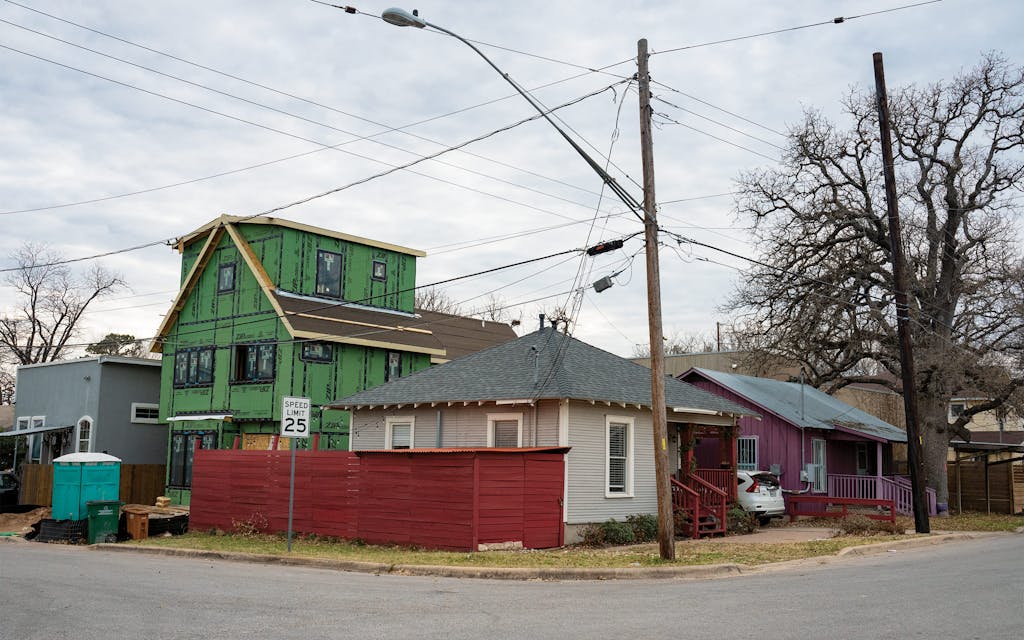
None of the STRs immediately surrounding Thompson’s home compared to the newest one, however. As neighbors would soon learn, the home had been purchased by a limited liability corporation managed by the owner of an upstart Austin-based “vacation rental investing” company called UrbanStay, which had turned the former residence—as well as more than twenty others in historically Black and brown neighborhoods across East Austin—into a full-time short-term rental property marketed toward big-spending, hard-partying tourists in their twenties. As inquisitive neighbors had long suspected, the school bus violated city code and the pool had been built without a permit, according to city records. Despite being operated as a business, records show the home is benefitting from the previous owner’s homestead exemption, a mechanism to lower tax bills that is reserved for owner-occupied homes, according to the Travis County Central Appraisal District.
Prior to construction, the residence had three bedrooms. Now, with closets converted into miniature sleeping quarters, it contains seven bedrooms with fifteen beds, allowing the property to function as a minihotel with enough room to sleep over a dozen guests each night. With a flashy, Instagram-friendly aesthetic that could be described as Miami Vice meets Wayfair, white walls have been painted hot pink and black and adorned with generic prints of palm fronds and photographs of tigers. Above select beds, glowing neon signage with suggestive phrases such as “Take Bold Action” encourage visitors to abandon restraint.
Outside, the mostly empty backyard has been recast as a playground befitting a frat house, complete with cornhole boards, a fire pit, a hot tub, a putting green, and access to the mysterious yellow bus. With one side covered in graffiti and an image of a sinister-looking blue dragon holding nunchucks, the vehicle looks like a prop from a low-budget early nineties hip-hop video. Inside, things get even cheesier. After the row seating was removed, the bus’s interior was painted red and black, setting the mood for the property’s crown jewel: a shiny stripper pole illuminated by a flat-screen TV.
Since the home was posted on Airbnb, neighbors have watched it become a go-to destination for live-streamed product launch parties, group retreats, and rowdy bachelor and bachelorette parties. The revelers typically arrive every few days from around the country, paying hundreds and sometimes thousands of dollars per night (often with a three-night minimum). One neighbor came up with a label for the packs of shirtless young men who arrive in party buses and come and go on electric scooters, carrying cases of alcohol, vomiting in the street, peeing in the bushes, and partying into the early morning hours week after week: “monetized nuisance.”
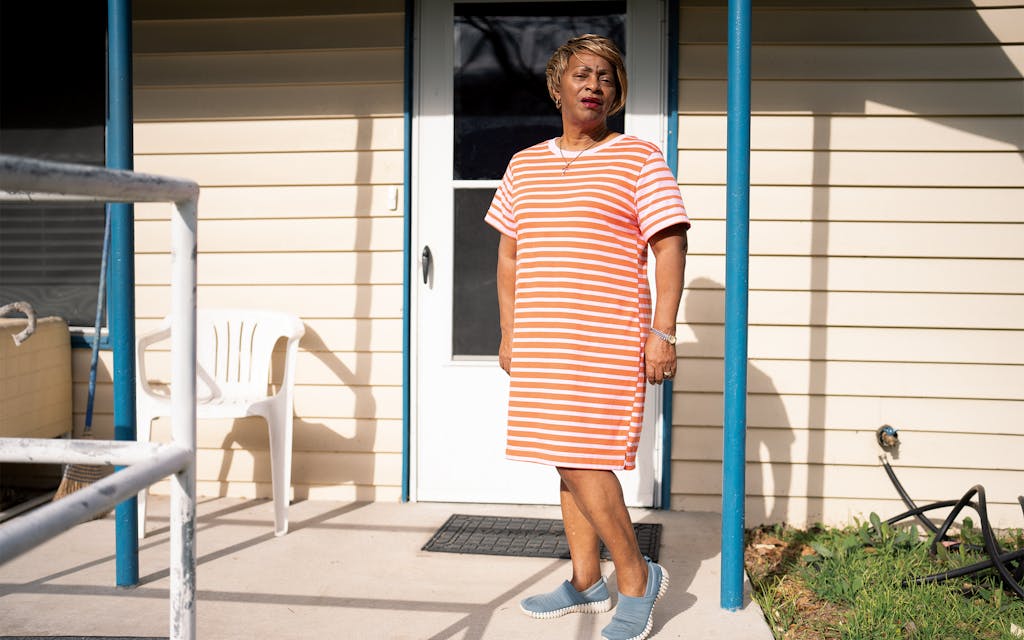
For Thompson, the mayhem is more than that. All the STRs with multimillion-dollar price tags on her block have dramatically increased neighboring home values. She said her property taxes have doubled to about $1,000 per month over the past two years, enough to threaten her future in the neighborhood. Most weeks bring new flyers, phone calls, and visits from young white people asking to buy her property outright, including one individual who proposed building a new home on the lot for himself and allowing her to live in a smaller unit hidden in the backyard.
Each time, the message is clear: the newcomers want her land, but they don’t want her. “One person came to my door and told me that I could sell my house to them and go into assisted living,” she said. “That ain’t why I’ve been paying a mortgage for the last thirty years, to go live in some facility like I’m on the verge of dying. You moved into my neighborhood. You don’t get to tell me to leave!”
Almost anywhere you find tourists in Texas, from waterfront neighborhoods on Galveston Island to the ghost towns in the western reaches of the state, locals are bemoaning the changes unleashed by short-term rentals and the visitors who temporarily inhabit them. In Dallas, where one neighborhood STR was turned into a raucous wedding venue, infuriating neighbors, the city council is weighing a plan to outlaw STRs from residential neighborhoods. In Fredericksburg, the popular Hill Country getaway, locals have blamed STRs for exacerbating a severe housing shortage. In Wimberley, about an hour southwest of Austin, they’ve been accused of encouraging debauchery. But when it comes to STRs in Texas, there is no place quite like Austin. The influx of STRs is inextricably linked to the city’s transformation, in just over a decade, from one of the most affordable cities in America to one of the least. Between 2000 and 2010, Austin was the only city in the U.S. experiencing double-digit growth that also saw a decline in the percentage of its Black population—a decline that continued over the next decade. No longer a countercultural haven for artists and independent thinkers, Austin has embraced a new role as the tourist-obsessed, bachelor party–dependent STR capital of Texas—a kind of Las Vegas with tacos in which it can feel as if the real world has been subsumed by the digital one being marketed on Instagram by newly-arrived influencers and real estate agents.
There may be no better illustration of this imbalance than the city’s seeming state of denial when it comes to its own housing crisis. While the influx of tech workers with higher salaries is often blamed for the city’s catastrophic affordability problems, the role played by STRs is rarely acknowledged by city officials, much less publicly debated in depth. In this gaslit reality, human displacement is a “growing pain” and cultural loss an inevitability, allowing Austinites to normalize wine-tastings and staycations in upscale STRs that, until recently, housed working-class families. Eric Tang, an associate professor of African and African Diaspora Studies at the University of Texas at Austin, led a 2016 survey of Black former East Austinites displaced by gentrification. Tang and other longtime residents speculate that STRs fly beneath the radar because they play an instrumental role in housing a significant chunk of the more than 30 million tourists who visit Austin each year and pump an estimated $8.2 billion into the local economy.
At a city council meeting in September, José G. Roig, the director of Austin’s code department, said that there are about 11,000 Airbnb rentals within the city limits, but some housing experts say that number is closer to 13,000—and climbs above 18,000 when rentals in the larger metropolitan area are included. Even at the low end of those estimates, as of December, Austin had nearly twice as many STRs as Dallas (5,795) and New Orleans (6,776), but slightly fewer than the more populous Las Vegas metro area (15,184) and San Diego (12,781), according to Inside Airbnb, a website that publishes localized data about the San Francisco company.
Roig told council members that fewer than two thousand of Austin’s STRs are licensed, as required by law, a number that continues to drop as licenses expire while the number of rentable properties continues to rise. And according to Airbnb’s estimates in a February 2022 presentation to Austin’s Arts Commission, those unlicensed rentals cost the city as much as $20 million in lost hotel occupancy tax revenue each year. “Even if a city does have zoning laws in place, properties are listed on Airbnb almost anonymously,” said Murray Cox, the founder of Inside Airbnb. “They can see the approximate location of a rental online, but the local officials don’t usually have access to specific location data, so they’re really relying on companies to self-regulate when it comes to complaints or even knowing which locations are operating with a permit.”
Airbnb disputes the notion that its business model contributes to gentrification in Austin or elsewhere. Though the company doesn’t appear to have taken any specific measures to dissuade investors from turning Austin’s housing market into a haven for STRs, Airbnb says the vast majority of Austin hosts—83 percent—list just one home, an indication that they are individuals instead of companies. In Austin, the company says, hosts depend on the extra income to cover the city’s rising cost of living. This is true of hosts in cities around the world. “Hosts and local small-business owners frequently tell us that home sharing has helped their communities grow and thrive in the face of increasing gentrification, and we welcome the opportunity to work with city leaders and community groups on ways to help ensure short-term rentals continue to support residents and the local economy,” a company spokesperson told Texas Monthly.
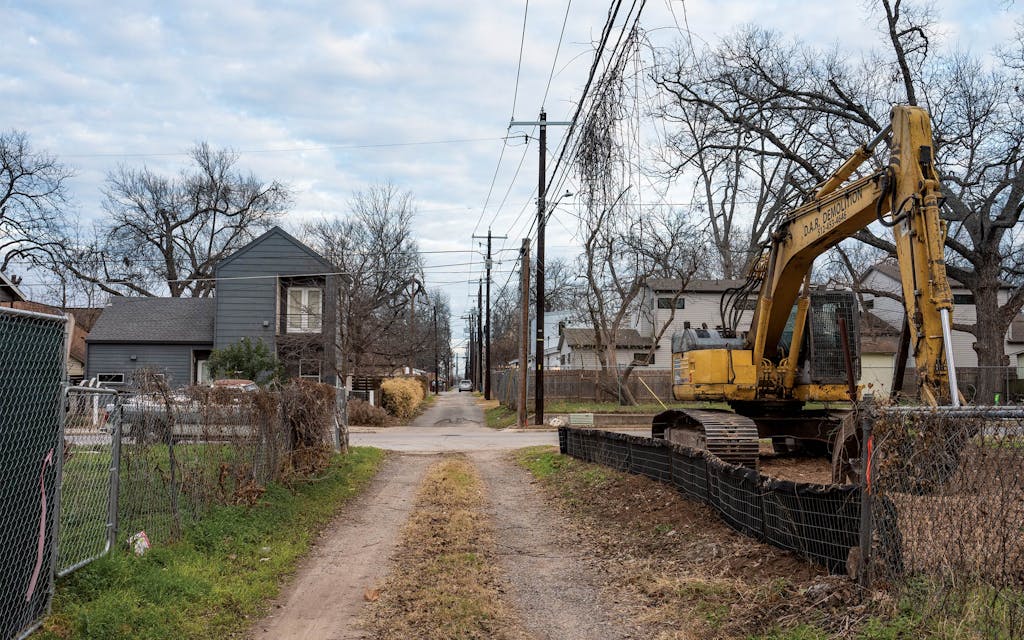
Responding to Airbnb, Cox said it’s possible for most Austin listings to be connected to single hosts, but that doesn’t necessarily mean those hosts are based in Austin full-time. According to Cox’s data, as recently as December, just over half of the city’s Airbnb listings feature an entire home as part of a larger real estate portfolio. “Airbnb’s argument is like saying the majority of the population are not millionaires or billionaires as an argument against the ridiculous wealth and power of the one percent,” Cox said.
When compared to its competition, UrbanStay looks like small potatoes. Host companies such as Vacasa and Landing—both of which are national and have been financed by venture capital—have hundreds of listings spread across Austin. Cox’s data show the number of Airbnbs increasing steadily in Austin over the past seven years before exploding in popularity last summer. During that same period, Austin was named the country’s best place to live in by U.S. News & World Report’s annual rankings three years in a row.
Cox and other housing experts argue that in cities with housing shortages, such as Austin, short-term rentals place significant pressure on renters by limiting an area’s supply of rental dwellings and increasing the cost of living. Last summer in 78702, a zip code that covers much of East Austin, Inside Airbnb’s estimates showed more than 1,300 Airbnb listings available, making up about 11.5 percent of the area’s housing stock. At the same time, there were only 270 long-term housing units available to renters in the area, a shortage that is likely to have increased local rental costs.
For local residents like Phil Thomas and Carol Stall, retired East Austin residents who have spent the past decade fighting for more STR regulation, the wave of Airbnbs in 78702 and the housing crisis that has followed are symptoms of a larger crisis of community. “When you have a constant parade of people coming through, regardless of whether they’re partying, it’s not a community anymore,” Stall said when I visited the couple’s East Side cottage on a recent Saturday. “They’re not voting, they’re not watching to make sure your property is safe, and they’re not sending kids to school, which explains why the enrollment at our local elementary school got so low the district closed it down.”
Stall was referring to Metz Elementary School, a predominantly Latino school with an ethereal mural of Cesar Chavez inside the building, which closed in 2021—only 29 years after the district erected a brand-new building for the school. For Stall and Thomas, the disappearance of children is not just eerie, rendering streets that used to be filled with playful voices oddly quiet; it’s a sign that the neighborhood, and its housing supply, is now influenced by STR investors, who have made it even more difficult to replace middle-class families that are being forced out by rising costs. “The question for Austin is whether the city really wants to have neighborhoods that normal people can live in,” Thomas said. “Because we’re becoming a place that caters to a transient population and to extreme wealth—a theme park, if you will.”
Austin’s attempt to regulate short-term rentals has met fierce resistance in the courts. In 2016, local leaders passed an ordinance that banned short-term rentals at non-owner-occupied houses (which are classified more specifically as Type 2 STRs) in residential areas by 2022. These sorts of rentals are most often blamed for driving up property values, reducing housing supply, and injecting touristic chaos into otherwise quiet residential communities. But Austin’s efforts to put limitations on STRs have been stymied by Texas courts that prioritize property rights over quality-of-life regulations, ruling that homeowners can rent out their properties for as short, or as long, a period as they please. Despite a recent lawsuit from a Houston couple that wants to use their second home in Austin as an STR, the city is refusing to issue new Type 2 licenses.
Austin is far from the only location around the country that has struggled to regulate short-term rentals. In Arizona, Michigan, Ohio, and Tennessee, the same pattern has repeated itself: Republican state legislatures have introduced bills aimed at superseding local jurisdictions’ ability to regulate short-term rental units. In August, the ultraconservative U.S. Court of Appeals for the Fifth Circuit (which covers Texas, Louisiana, and Mississippi) delivered a powerful blow to advocates of local regulation—in Austin and elsewhere—when it struck down a 2019 New Orleans ordinance that required STR license holders in residential neighborhoods to reside on the properties. In Hignell-Stark v. City of New Orleans, the three-judge panel overturned a lower-court decision upholding the local law, ruling that its primary-residence requirement violated the U.S. Constitution’s Commerce Clause, which prohibits governments from restricting interstate commerce. To counter the misbehavior that often occurs at owner-unoccupied homes, Fifth Circuit judge Jerry E. Smith said in his ruling that cities could instead increase taxes on STRs, place limits on STR licenses, or hire chaperones of sorts to act as a form of “ ‘adult supervision’ that the City ostensibly hopes live-in owners will provide.”
During the September Austin City Council meeting focused on STR enforcement issues, Brie L. Franco, an intergovernmental relations officer with the city, expressed concern that more deregulatory challenges may lie ahead. During a presentation on STRs, Franco detailed efforts by Republican state legislators, beginning in 2017, to introduce legislative bills that preempt cities’ ability to enforce code violations beyond basic health and safety measures by making the state the licensing agent for STRs. The first bill, Franco noted, was filed by Senator Kelly Hancock, a Republican representing North Richland Hills, who chaired the Senate Business and Commerce Committee at the time. The bill passed in the Senate, but eventually died in the House.
In 2019, state representative Angie Chen Button, a Republican from Richardson who was then chair of the Urban Affairs Committee, filed a similar bill that didn’t make it out of committee. The same bill was reintroduced last session but didn’t get far. If such a bill does pass in this session, it could make the state the licensing agent for STRs and keep cities like Austin from determining their own zoning. “I think we’re going to have another STR fight on our hands at the Legislature this session,” Franco told the council members in September.
About a week after the state legislature convened last month, Airbnb and short-term rental company Vrbo (now owned by Expedia) hired three lobbyists each, according to a registration list published by the Texas Ethics Commission. Though lobbyists for Expedia didn’t respond to a request for comment, an Airbnb spokesperson said the company had, in the past, “engaged” with members of the Texas Legislature on behalf of their constituents, particularly on issues related to tax collection. Dave Schwarte, a member of the Texas Neighborhood Coalition, a nonpartisan alliance of homeowners from across the state who oppose the proliferation of STRs in residential neighborhoods, said Airbnb postures like a local, but its agenda remains corporate. “Clearly, the deep-pocketed STR businesses intend to swarm the legislators with high-paid lobbyists, in an effort to drown out the voices of the voters,” he said. “We’ve seen how this movie ends in other states, and it’s a horror film.”
Last summer, Airbnb introduced technology designed to crack down on guests who are considered high partying risks. By taking into account guests’ previous reviews from hosts, the lengths of potential stays, and the days of the week reservations fall upon, Airbnb says it will reduce the ability of what it calls “bad actors” to make reservations for entire homes. “This anti-party initiative is meant to support both our Hosts and neighbors,” the company said.
The crackdown may have begun, but from the looks of Pete Mason’s laptop screen on a Friday night last fall, it didn’t appear to be having much effect. A fifty-year-old dad who exudes a calm authority left over from his days working as a Houston cop, Mason is one of Austin’s six code inspectors focused on STR regulation. Sitting at his desk inside an office building near Austin-Bergstrom International Airport, he looked unsurprised each time a new batch of complaints indicating a party in progress landed in his inbox.
In most cases, the complaints, especially those from East Austin, came from neighbors living near notorious short-term rentals; on this night, someone down the street from the Castro Street STR reported a large gathering at the home. “I recognize most of these addresses,” Mason said. When it comes to following up on complaints, Mason’s power is limited. Without the help of police or the fire department, he can’t shut down a gathering or even issue a citation on the spot. With the Fifth Circuit ruling further complicating enforcement, city officials are reevaluating what authority, if any, they have to regulate the STR market outside of essentially pleading with the public to behave.
So, Mason and his colleagues spend much of their time quietly gathering clues, documenting permit violations and noise complaints, and gradually compiling cases that may never end up in court. “We do a great job with verbal judo,” he said, referring to his tactics for getting occupants of a party house to cough up useful information, such as confirming that they are, in fact, temporary renters at an unlicensed STR. (According to Mason, many party-house owners instruct guests not to open the door for code inspectors, or to lie and say they’re relatives of the owner, not STR customers).
If owners refuse to comply with code enforcement, the city can, in theory, begin to issue daily fines as high as $1,000—an amount some high-priced Airbnb properties can net in a single night. Though code inspectors have managed to get some cases into municipal court, where the fines are as high as $2,000 per violation per day, property owners have another advantage on their side. “Municipal court has a backlog two hundred cases deep, so even though I have three or four homes that should be in municipal court, it could be months before they are, and even then the cases could be dropped and we have to start all over,” Mason said. “Ideally, we’d have more teeth, like the ability to issue citations on the spot or issue fines based on someone posting an unlicensed rental online—that would shut down some of these houses instantly.”
Among the repeat offenders with numerous code violations that Mason has been investigating for months is UrbanStay, which has racked up numerous code violations over the last year. Mason rattles the company’s addresses off the top of his head like he has family members living there.
Indeed, for many advocates of STR regulation, especially in the gentrifying core east of downtown, UrbanStay remains the prototypical bad actor. Josh Reed, the company’s founder, is an Austin native with a degree from the McCombs School of Business at the University of Texas at Austin. Despite a mostly relaxed public posture, on Linkedin, Reed uses the same motto that hangs on the bedroom wall of his Castro Street party house: “Take Bold Action.”
UrbanStay offers guests access to boutique properties, most of them in East Austin neighborhoods that offer quick access to downtown nightlife. In addition to property rental, the company’s business model is also focused on vacation-rental management, investing, and financing that promises to help clients maximize earnings. UrbanStay claims its residences have great “vibes” thanks to its director of operations, a PhD in economics who also serves as the company’s resident “meditation instructor and energy healer.” On Airbnb, the company is designated a “Superhost,” despite neighbor complaints filed through listing pages on the site. The host’s listings also include reviews from company employees posing as customers, not bothering to change their names or profile images, a Texas Monthly review of the company’s listings found.
When asked about reviews written by UrbanStay employees Reed didn’t address the issue. Though some of the company’s listings say no partying is allowed, the same listings repeatedly frame the rental experience as one that revolves around drinking, pointing out the home’s proximity to “boozy” nightlife districts. “This is a truly awe-inspiring space and one you’ll never forget, depending on how many drinks you plan to have,” one listing notes.


When asked about accusations from city officials that the company runs party houses, and about quality-of-life complaints from residents living near UrbanStay properties, Reed issued a statement saying the company takes its “stewardship” of the city and its residents “seriously” before breaking into rhyme: “We certainly can’t claim perfection in either direction; we’re here with open ears in this chance for reflection,” the statement continued. “Walk before you run, shimmy before you groove. We appreciate this public dance and the chance to improve.”
The heart of the UrbanStay empire lies a short walk from Rainey Street, the popular nightlife district, at a formerly quiet East Austin intersection about a block from a local elementary school. Here, on land where the last traces of the old neighborhood still remain, at least three UrbanStay properties—all of them white farmhouse-style McMansions with privacy walls—are bunched together. Electric scooters are often strewn across the homes’ front lawns and driveways—a telltale sign that longtime East Austin residents use to identify the locations of new party houses in the neighborhood. Outside one of the homes on a recent evening, past vehicles with license plates from Arizona, Ohio, and Wisconsin, the cheers of a rowdy beer-pong game and filled the street, which reeked of marijuana and cheap cologne, giving passersby the impression of strolling through a college campus the night before a big football game.
On the same street about a hundred yards away, that feeling was no longer purely metaphorical. At another UrbanStay property known online as the “Pristine Pool Palace,” guests had announced their arrival by hanging a massive banner from the second-story balcony. Printed across the banner—like some medieval declaration of ownership—was a gigantic photo of 35 fraternity members from Tau Kappa Epsilon in their finest evening wear. “Autumn 1985,” a caption at the bottom of the image read. Based on the frolicking sounds coming from the home’s backyard pool that night, the brothers, now softer and grayer, seemed delighted to have found a new frat house in which to roll back the clock, if only for the weekend.
A few blocks away, on Haskell Street, in a modest one-story home with bright yellow flowers outside, Elisa Rendon Montoya is struggling to accept the invasion of the party houses. A sign in her front yard makes her position clear: “Keep the NEIGHBOR in our NEIGHBORHOOD: NO STR-2’s!”
Sitting in a living room lined with black and white photos of working-class shopkeepers, long-ago weddings, first-time home purchases, and decades of protests, her walls tell the determined story of Mexican Americans in East Austin. Like so many in her generation, the 69-year-old Austin native has spent her entire life on the city’s East Side, becoming a respected community activist among a family of respected community activists.
A few blocks away, Edward Rendon Sr. Park at Festival Beach (or Chicano Park, as locals call it), which runs along Lady Bird Lake south of Interstate 35, is named after her father, himself a legendary organizer who marched alongside Cesar Chavez, often with his daughter at his side. Montoya’s daughter’s godfather was Paul Hernandez, another well-known Chicano activist and political organizer who helped found East Austin’s Brown Berets and led the late-1970s fight to abolish Aquafest powerboat races along the Colorado River. East Austin residents blamed the earsplitting races for turning their quiet, close-knit neighborhood into a rowdy tourist destination. The city would never tolerate the same degree of chaos, they argued at the time, in wealthier, whiter parts of town. Today, Hernandez’s portrait is prominently displayed in a mural at Chicano Park.
Like many longtime East Austin residents, many of Montoya’s family members were living and working around downtown Austin in the middle of the twentieth century before racist rezoning policies allowed the city government to turn private land into commercial districts. The changes forced Black and brown Austinites eastward, where land was, at the time, both undesirable and cheap. As a little girl, Montoya spent her summers doing migrant farmwork in the Midwest, where each dollar brought her family closer to a collective goal: saving enough money to buy a place of their own on the East Side. Her parents’ generation quickly learned that buying property was only half the battle. Next they would be forced to defend it. By the time Montoya was an adult in the 1970s, local activists were already locked in brutal struggles to preserve their neighborhoods, enduring vicious beatings and jail time when protests were targeted by authorities.
In the nineties, Montoya fought to shut down the Holly Street Power Plant, which residents blamed for destroying home foundations and spiking cancer rates. Once the plant was shuttered, they knew it would usher in new threats to the area. “We knew that as soon as the plant shut down, the value of the land was going to skyrocket,” Montoya said. “And sure enough, the day after it closed in 2007, letters from developers began showing up in our mailbox offering to buy our properties.”
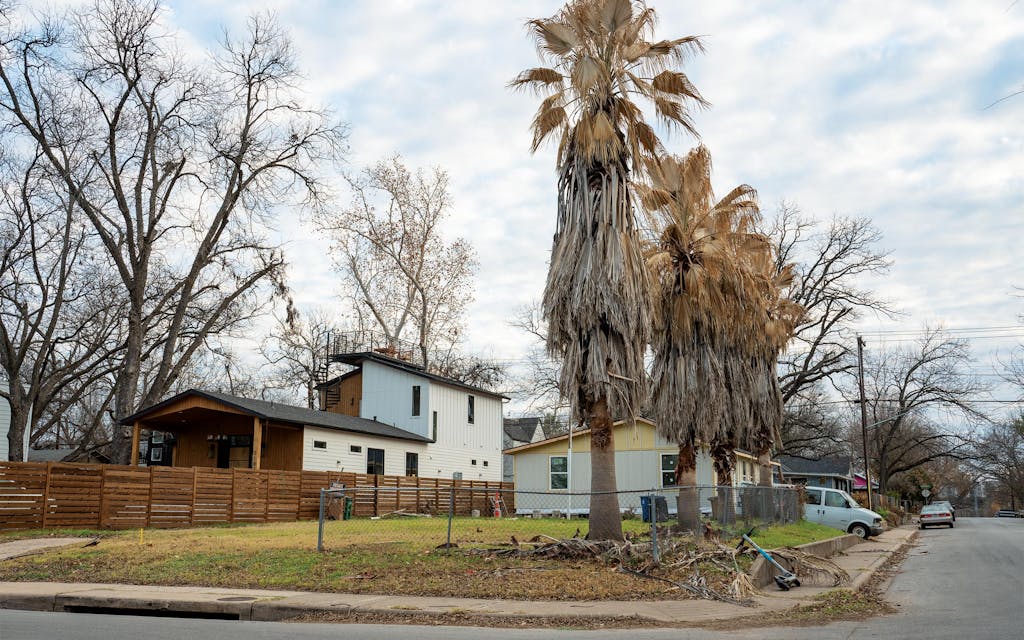
More than fifteen years later, Montoya’s own street, which is about a mile from Rainey Street and dotted with STRs, is nearly unrecognizable. A few houses down from Montoya’s, limousines and party buses regularly linger outside a former church that has been converted into a popular STR. At night, packs of tourists and drunken tech workers roam the streets on electric scooters, running into parked cars and screaming obscenities. During major festivals such as South by Southwest, Montoya and many of her neighbors have become accustomed to drugged-out revelers passing out in their front yards or ringing their doorbells late at night, confused, lost, or in search of help. “A month ago, we found a naked young woman hiding in my driveway acting hysterical,” Montoya said. “She claimed she had been raped.”
These days, more and more people, including some family members, are urging Montoya to sell her three-bedroom home, which she’s owned since 1991. But Montoya, who is retired, refuses to budge, even as rising property taxes force her to live paycheck to paycheck. She has thirty grandchildren and six great-grandchildren, and the older she gets, the more she wants to spend her days surrounded by them in the only community she’s ever known. And yet, some days, the fight to maintain a homestead, to carve out a tiny slice of the American dream in East Austin, feels just as precarious now as it did fifty years ago. “My parents’ generation opened the door for us, and then it took people dying and being beaten by batons to get us this land,” she said. “I’m not just going to leave.”
East Austin STR owners have no plans of leaving either, even when their neighbors might prefer otherwise. Toward the end of 2022, after many months of rowdy parties and complaints from neighbors, the UrbanStay party house on Castro Street down the block from Mary Thompson was removed from Airbnb’s website—likely because of dozens of direct appeals, with photographic evidence, to the company’s neighborhood support center. For frustrated neighbors, it was only a partial victory. Despite increasing scrutiny in recent months, most of UrbanStay’s properties remain on Airbnb, and the company continues to solicit new East Austin properties for its growing portfolio. The Castro Street house is still available for rent on UrbanStay’s website, and the backyard school bus with the stripper pole is still being marketed to guests despite months-old demands from the city that the vehicle be removed from the property. In group chats, neighbors have begun referring to the vehicle as “the pedobus” because of their concern that it is luring an unsavory element to the block and placing their children in danger.
Not long after the Castro Street house was deplatformed, Reed, UrbanStay’s owner, sent letters and emails to nearby residents expressing regret about the ongoing noise, the parking issues, and the sexualized school bus. Despite months of complaints, it was the first time most residents had heard from the young businessman. “It sucks to be a shitty neighbor,” he wrote in one exchange after offering to build an eight-foot fence to hide the vehicular eyesore. “Unfortunately,” he added, the home’s purchase “has already been made.” Instead of removing the bus, which, he argued, wouldn’t solve the noise issues and would be “really expensive,” he proposed a financial solution to address the excess cars crowding the street, one that some neighbors quickly labeled a bribe. Reed invited his neighbors to join him in doing what he and so many other STR owners were already doing: turning one of Austin’s historic minority communities into an investment opportunity. “I could setup $100 auto transfer WEEKLY to compensate you for each group that comes and stays at the property,” Reed wrote in an email exchange obtained by Texas Monthly. “I will double the amount if you elect for the proceeds to go to a charity of your choice or for your children’s 529 college tuition (a $58k value over 5 years earning 8% interest).”
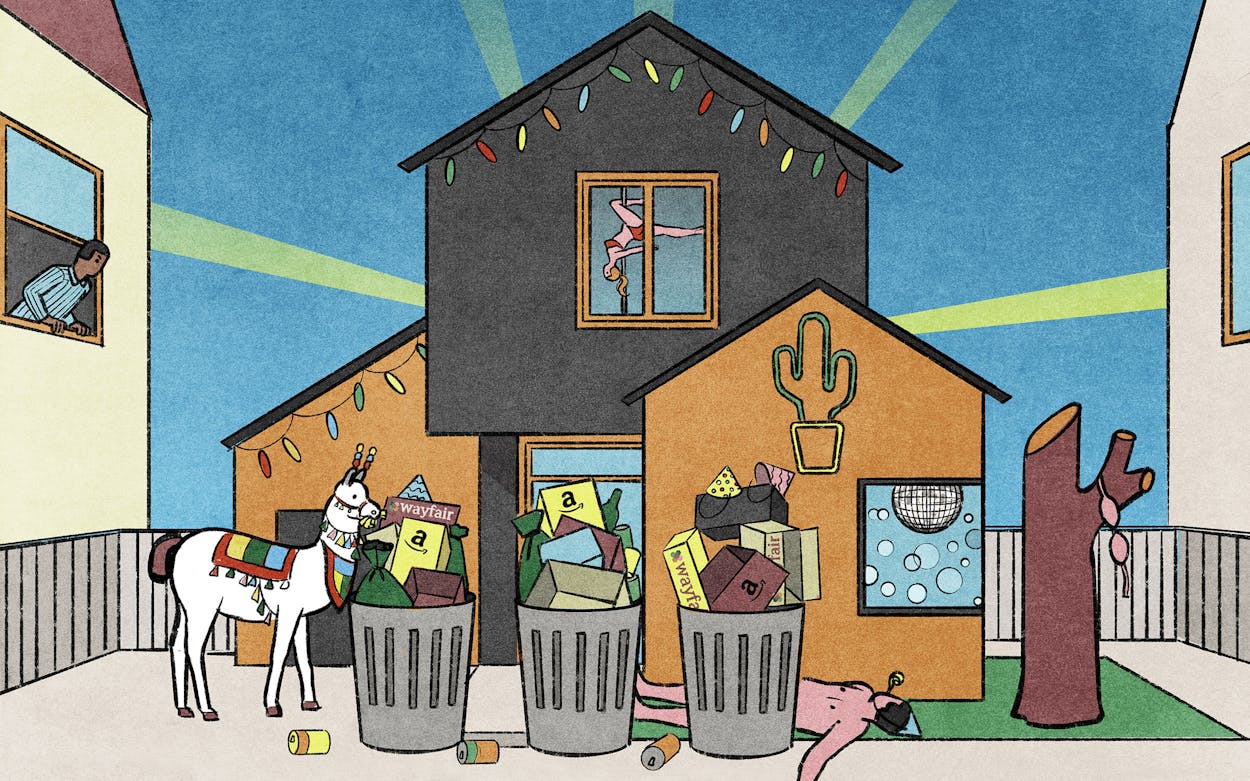









Comments